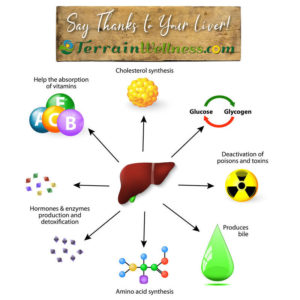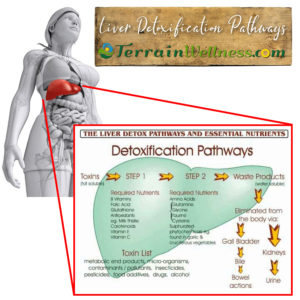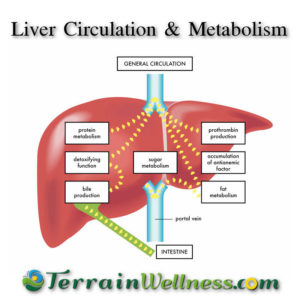Healthy Lymphatics (and why it matters)
The liver and the gut are two primary systems responsible for eliminating waste products and toxins from the body (detoxification) processes in your body. The lungs and integument (skin) also eliminate waste/toxins too, but today we’re focused on liver/lymphatics/gut. The lymphatic system is responsible for draining out the fluids and toxins/waste-products excreted from the body’s cells. Healthy lymphatics are crucial for immune support because lymph nodes also make white blood cells called lymphocytes that fight disease. The lymphatic system transports waste/toxins away from cells while also serving a main role in immune function.
The liver in action
The liver is responsible for cleaning the blood and processing chemicals, heavy metals, many medications, alcohol, drugs and hormones so they can be removed from the body. The liver is also involved in absorbing certain nutrients, neutralizing chemical byproducts which may then be stored or eliminated from the body. In Chinese medicine, we call the liver “The General” it gives orders to the gallbladder “the foot soldier” and reports directly to the “emperor” the heart. The liver is involved in processing fat, sugars and carbohydrates into forms of energy that are directly useful in the body. Note: check out our other article for a concise look at the specific steps of liver detoxification.
The liver produces a substance called bile which is involved in a variety of processes, chiefly, breaks down fats so that the energy stored with the fat molecule can be utilized by the body. The liver makes forms of cholesterol that the body needs to produce hormones, cell membranes, brain tissue and lymphatic fluid. The liver makes both HDL “so-called good cholesterol” and LDL “so-called bad cholesterol,”. Despite the overly-simple good/bad labels, both HDL & LDL Cholesterol play vital roles in nervous system health, immune system repair, production of digestive acids and the production of fat-soluble vitamins.
Glutathione & The Liver
The liver also has a vital role in the production of a substance called glutathione. Glutathione is a powerful antioxidant involved in fighting chronic viral infections, eliminating toxic substances including heavy metals from the body and aiding in the body’s stress recovery process. Unfortunately, glutathione is often very low in individuals who have eaten the “Western/American Diet” or been exposed to toxins such as cigarettes, alcohol and drugs.
In our clinical practice in Portland, Oregon, we also see low glutathione levels people who have ongoing problems with stress, chronic viral infections such as Epstien Barr virus or exposure to heavy metals from food or environmental polution. Low glutathione levels may be partly due to the fact that it is poorly absorbed from the diet, which is one reason we often recommend a glutathione push at the end of many of our IV therapy sessions. Delivering glutathione via a push at the end of an IV nutrition infusion bypasses the gut while providing all of the co-factors, vitamins and nutrients directly to the body in one sitting. To be clear, IV therapy does not replace the need to consume nourishing foods, especially certain vegetables like broccoli, cauliflower and cabbage. These vegetables are high in the ingredients necessary for the body to produce its own glutathione while also supporting many other healthy processes in the body.
The Complex World of Gut Health
The digestive system, or “gut”, is not just a tube that connects the body from entry to exit. The gut is a complex network of connective tissue and immune complexes that control everything from nutrient assimilation and elimination of toxic substances to the production of neurotransmitters responsible for health sleep and mood. The gut is also host to its own internal ecosystem made up of beneficial living microflora also called probiotics. These probiotics are actually bacteria that live inside the body and help the body with digestion, nutrient absorption and the synthesis of certain nutrients. For this reason, gut health isn’t just about the person’s health, it’s also about improving the health, types and quantity of helpful bacteria living inside the body. One can’t have a healthy gut without healthy gut bacteria. And, one cannot be fully healthy without a healthy gut. Because it’s directly tied to the body getting the nourishment it needs, gut health and a well-balanced gut microbiome are pivotal to healing from chronic diseases including autoimmune diseases and rebuilding an over-taxed immune system.
At the risk of oversimplification, an unhealthy gut is one that rejects healthy bacteria and encourages bad bacteria. To achieve lasting results, we need to reverse those processes and develop a system that encourages beneficial microbes while being inhospitable to bacteria that are harmful.
At the risk of oversimplification, an unhealthy gut is one that rejects healthy bacteria and encourages bad bacteria. To achieve lasting results, we need to reverse those processes and develop a system that encourages beneficial microbes while being inhospitable to bacteria that are harmful.
Certain foods, medications and other factors can negatively influence gut health. In our clinical practice, we have found that people’s gut health plays at least some role in many of our patients health concerns (whether they know it or not). Good things take time, and when it comes to improving digestive health there are quick fixes and sustainable fixes, but these are not the same thing. Simply taking a probiotic will not address the health imbalance that caused the problem to begin with. At the risk of oversimplification, an unhealthy gut is one that rejects healthy bacteria and encourages bad bacteria. To achieve lasting results, we need to reverse those processes and develop a system that encourages beneficial microbes while being inhospitable to bacteria that are harmful. On average, it takes patients anywhere from 8-18 months for digestive systems to completely repair. This naturopathic medicine approach can be slow, but on the other side of a healthy gut is a healthy mind and body.
If Gut Health Takes Time, What Can I Do Now?
While lifestyle changes and naturopathic treatments focus on longterm gut recovery, it is also helpful to support the body in the short-term so that healing can be expedited. This is one of many reasons we recommend that most patients replete vitamins and minerals using IV therapy to get the body the nutrition it has been missing while we also do the slow work of restoring gut health. Of course, it’s important to realize that IV therapy without also rebuilding the gut will help a lot in the short-term, but it is not a permanent fix. Most of our patients have customized nutrition plans to help in the background but we also use IV Therapy as a valuable tool for getting extra nutrition into the patient’s body fast. The added nutrition of IV infusions helps the body fight off bad gut bacteria and other pathogens while lowering inflammation and helping the body naturally slow or reverse other various disease processes.
Since the bloodstream supplies a constant flow of nutrients to the body’s cells, how does the body remove the waste, toxins and by-products? The answer is lymph. The lymphatic system’s vast network of tubes creates a return mechanism by which the by-products of cellular activity as well as stored toxins can be removed from body tissue.
Healthy Lymphatics Begin Here
Since the bloodstream supplies a constant flow of nutrients to the body’s cells, how does the body remove the waste, toxins and by-products from those cells? The answer is lymph. The lymphatic system’s vast network of tubes creates a return mechanism by which the by-products of cellular activity as well as stored toxins can be removed from body tissue. The lymphatic system also has a series of vessels, organs and tissues that aid in fighting off bacteria, viruses and eliminating toxins throughout the body. The lymphatic system contains a fluid called lymph, which is full of white blood cells, immune cells primed to fight invaders. The lymphatic system drains debris, damaged cells and the fluid that collects in body tissues and organs. This system also plays a key role in fat absorption as well as the absorption of fat-soluble vitamins, like vitamins A, D and E. The spleen, thymus and the body’s many lymph nodes are all part of this vast network of tubes that lie outside the bloodstream. The lymphatic system rejoins the circulatory system by dumping lymph into the subclavian vein near the heart. Once back in the bloodstream, the waste, toxins and by-products found in lymph are filtered out by the kidneys or liver and eliminated through bowel or urine.
Thanks for reading. We hope you found this article helpful.




